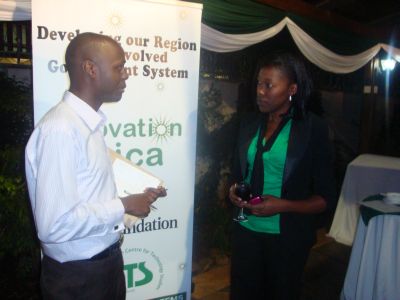Devolution: What Future for Local Governments ?

 |
|
L-R: Viola A.Otieno; Marcel C. Werner; Judi W. Wakhungu and others pose with a replica of the book. |
The publication identifies that with devolution, local authorities will be at the forefront of the development agenda. It notes challenges that local governments face which include: failure to implement the plans drawn up, limited resources, inaccessibility of information and lack of participation by local citizens.
The book authored by Marcel C. Werner, Viola A. Otieno and Prof. Judi W. Wakhungu recognizes the role of ICT in the development of the local Governments. It emphasizes the need for mainstream ICT solutions such as local area networks at council headquarters, websites and SMS customer service, a service which has been adopted by few local government offices such as Makueni County.
“The customer service SMS is a great idea, it gives an opportunity for citizens in far rural areas to raise their complaints, suggest solutions, complement leadership, ask questions and get immediate response. This text messages are analyzed frequently which helps us in prioritizing issues and increase citizens participation the counties development,” Comments Robert Musyoka, Makueni Council town clerk.
 |
|
EASC Program Manager Raymond Kiptum has a word with Viola, one of the authors. |
Mr. Marcel C. Werner on the other hand believes that devolution will bring the local government close to the people. “Cities/towns impact the lives of people yet there has been a lot of neglect by the local Government. The government has been allocating a small per capita budget to local county council, 200 times less than some developed countries,” he notes. He believes that the book will make citizens to understand their council, be involved in decisions of the council and assist in economic development of the county.
Prof Judi Wakhungu praised Makueni County for being the first county in Eastern Province to have ICT programs such as the “SMS County.” She said that this should be an example to other counties. She also suggested that special training programs and seminars be done to enhance the transition to the devolved government.
The book was officially launched by Mr. Patrick Karanja, an official from the Ministry of Local Government. Mr. Karanja welcomed the publication saying that it is important for local authorities to read it since it applies to all the 47 counties. “We welcome any knowledge that adds value to our counties by establishing stakeholder driven institutions,” he said.
The book used Makueni County and other counties such as Nakuru, Eldoret, Nairobi and Taveta couties among other counties as case studies. The book aims at achieving economic development though citizen participation, execution of plans effectively and use of technology to increase revenue generation. It aims at improving the governance of local government offices through access to information and democratic interaction between citizens and the leaders.
The book, like Eastern Africa Sister Cities (EASC), encourages partnerships with other stakeholders to find solutions to common challenges such as food insecurity, disaster and conflicts. EASC provides avenues though which counties will be able to twin with others within and outside the region for mutual benefit. Through Sister City relationships, communities establish close relationships with other local or international communities. These partnerships allow the twinning communities to creatively learn, work, and solve problems through cultural, educational, municipal, business, professional, technical and project exchanges. EASC also holds forums that assist leaders in planning for projects and executing them, a problem identified by the authors of the book.
As the country prepares for a transition to the devolved system of governance, county leaders should be aware of the challenges expected. If the leaders are not aware of these challenges, there are chances of having unbalanced regions, which will not be healthy for a developing nation. It is therefore necessary that county leaders embrace the aspect of information sharing and encourage active participation of citizens in the running of the county. They should also seek twinning partners with other counties within and outside the country in an effort to share best practices and gain opportunities for growth.
By Raymond Kiptum
Program Manager, EASC.
